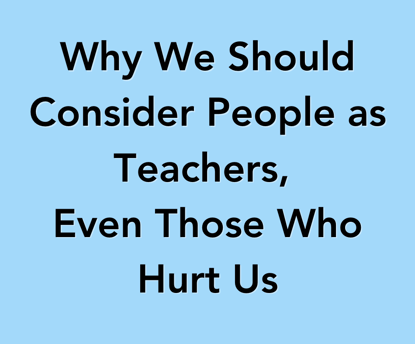Why We Should Consider People as Teachers, Even Those Who Hurt Us
When we can learn from our distress, we can transform it into wisdom and growth.
PERSONAL GROWTH
Monica JR
10/3/20233 min read


The word "guru" in Sanskrit means "dispeller of darkness." A true teacher is someone who brings light into our existence, enabling us to see the world and ourselves more clearly.
We commonly view teachers as individuals who instruct us in academic subjects or abilities. But the reality is that everyone we encounter in life, including those who wound us, can serve as a teacher.
When we get hurt, we learn the significance of forgiveness, compassion, and resilience. They also teach us about our own weaknesses and strengths.
Obviously, it can be challenging to be appreciative to those who have wronged us. However, if we can discover the lessons in our suffering, we can grow from our experiences and become more resilient and resilient individuals.
Here are some particular examples of how those who hurt us can also be our teachers:
A bully can teach us how to defend ourselves and others. We may feel helpless and afraid when we are bullied. But if we can have the confidence to confront the bully, we will discover that we are stronger than we anticipated. We might also learn how to speak up for others who are bullied.
A cheating partner can teach us the value of honesty and self-worth. We may feel deceived and heartbroken when we are cheated on. However, this experience can teach us the value of being honest with ourselves and others. We may also learn to appreciate ourselves more and to establish higher criteria for our relationships.
A toxic buddy may teach us how to set boundaries and safeguard our own well-being. Toxic friends are individuals who are exhausting, negative, and abusive. When we have a toxic companion in our lives, we may feel as if we are constantly treading on eggshells. This experience, on the other hand, can teach us how to create boundaries and safeguard our own mental well-being. We might also learn to identify the warning signals of a poisonous friendship and avoid them in the future.
A difficult boss might educate us to be more assertive and advocate for ourselves. When we work for a challenging boss, we may feel continually chastised and underappreciated. This experience, on the other hand, can teach us how to be more forceful and advocate for ourselves. We could also learn to grow a thick skin.
Even the most difficult experiences can provide us with valuable lessons. When we can learn from our distress, we can transform it into wisdom and growth.
This concept is beautifully captured by the following Kahlil Gibran quote: "I have learned silence from the talkative, toleration from the intolerant, and kindness from the unkind; yet, strange, I am ungrateful to those teachers."
Gibran reminds us that even those who teach us the most difficult teachings can be our most influential teachers.
If you are having difficulty forgiving someone who has wronged you, consider what you can learn from the experience. Consider what lessons you can learn from it to make you a better person.
Gratitude is a potent emotion that can aid in the healing of our wounds and the continuation of our lives. It can also help us become more empathetic and understanding people. Try to find something to be grateful for the next time you feel wounded or angry, even if it's just the lesson you've learned.
If the talkative person teaches us to listen, the rigid person teaches us to be more flexible, the liar teaches us the importance of honesty, and the cheater teaches us the magnitude of loyalty, then recall all the people who have irritated or angered you.
After recalling them, ask yourself what you've learned from them. If we are able to learn from these unpleasant experiences, we have gained something. Thank them for their assistance.
I recall perusing a piece contributed by the spiritual teacher from Bali, Guruji Gede Prama. He wrote that those who hurt us are actually 'angels' sent by God to help us grow. Without them, we would never face obstacles and never learn how to overcome them.
This type of perspective is necessary for a more harmonious existence. Therefore, if you encounter someone in the future who makes your blood boil, do not immediately become enraged. Imagine that the person standing before you is an "angel" sent by God.
***
Monica JR, 2023
